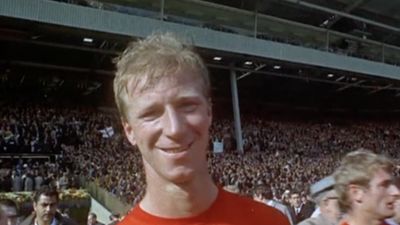World Cup winner Jack Charlton dies aged 85

Jack Charlton, the former Leeds United centre half who helped England win the World Cup in 1966, has died at the age of 85.
Charlton, who steered the Republic of Ireland to two World Cups as a manager, had been diagnosed with lymphoma in the last year and was also battling dementia.
Big Jack – as he was affectionately known – spent his entire club career at Elland Road, and was an integral part of the team that rose from Second Division obscurity to become, under manager Don Revie, one of the premier club sides in Europe. His 629 League appearances and 762 competitive games for Leeds are both club records.
His greatest coaching achievement came with Ireland, whom he led to two World Cup Finals in 1990 and 1994.
As well as the World Cup, which he won alongside his younger brother Bobby, he won the First Division title, the FA Cup and League Cup, and the Inter-Cities Fairs Cup twice as a player.
After retiring as a player, he became a successful club manager, guiding Middlesbrough to the First Division, and Sheffield Wednesday from the Third Division to the Second.
ITV Yorkshire’s Sports Correspondent John Shires writes:
Jack Charlton’s death robs us of one of the last remaining links with England’s only World Cup success. But it would be a mistake to remember him just for that one momentous victory against West Germany at Wembley. Big Jack deserves so much more than that.
Born into a footballing family in the mining town of Ashington in the North East – his motherCissie was a niece of the great Newcastle United and England centre forward Jackie Milburn – his was, in many ways, an unlikely story. Tall and angular, and as physically awkward as his brother Bobby was elegant, he left school to join his father in the local pit. It was only after three months, during which he’d realised how unpleasant life was underground, that he quit to take up the earlier offer of a trial at Elland Road.
Unlike Bobby, who was quickly recognised as one of the emerging stars of the game at Manchester United, Jack was a late developer. Don Revie once told him he didn’t rate him, and at one point in the early sixties he nearly moved to Liverpool.
He didn’t win his first England cap until 1965, just shy of his 30th birthday, but he was to become a stabilising influence in Alf Ramsey’s defence alongside the incomparable Bobby Moore. As well as being fiercely competitive, he was more skilful that he appeared. When he ventured forward into the opposition half and dribbled past a man, fans would cheer as though a goal had been scored.
Given that he had an extraordinary propensity to call his players by the wrong names or mispronounce them, he was an unlikely manager too. But he was successful at both Middlesbrough and Sheffield Wednesday, and unusually for a manager – even in those days – he was never sacked.
His players were fond of him, perhaps because he allowed them the freedom to express themselves on the pitch, not to mention the freedom to down a drink or two off it, and his success in taking the unheralded Republic of Ireland to two successive World Cups earned him legendary status across the water, as well as the Freedom of the City of Dublin.
His achievements brought him rewards far beyond the imagination of a 15 year old miner’s son from the North East coalfields, but he remained true to his roots. Throughout his life he retained his boyhood passions for wildlife, fishing and shooting.
And above all, speak to anyone who knew him well and they will tell you what a likeable and interesting companion he was.